Non-profit cooperatives known as Cannabis Social Clubs are making a significant impact on the cannabis industry, with their primary goal being to end criminalization and reduce reliance on the illegal market. These social clubs emphasize member welfare and advocacy, distinguishing themselves from profit-driven commercial markets commonly seen in countries such as the US and Canada. With mixed effects on public health and social justice aims, these commercialized markets often go against harm reduction principles.
- Focus on member welfare and advocacy
- Non-profit cooperatives
- End criminalization of cannabis
- Reduce reliance on the illegal market
Examples of Social Club Models
One country cited as embracing the social club model is Malta, which has developed a community-based approach to address unintended consequences and remove the criminal status associated with cannabis use. By promoting a non-commercialized market, Malta upholds harm reduction principles, a more sustainable approach for adopting policy reforms in the cannabis industry.
A Phased Approach to Policy Reform
Combining elements of the social club model with regulated supply, some countries have adopted phased approaches to policy reform. Key aspects of these reformed policies include:
- Limitations on membership
- Amount of cannabis distributed
- Location restrictions for associations
- Evidence-based information about cannabis usage requirements
This flexible and moderated implementation allows for more effective regulation while still supporting the goals of member welfare and advocacy.
Social Equity in Cannabis Supply
While social clubs have made impressive strides toward policy reform and promoting social justice (especially for marginalized communities affected by prohibition), eradicating reliance on the illegal market remains challenging. To fully address this issue, focusing more on social equity in cannabis supply can help tackle the unregulated market and become a driving force for necessary changes.
The Unique Strengths of Cannabis Social Clubs
Cannabis Social Clubs offer unique strengths that make them an essential player in future cannabis legalization reforms, primarily in promoting social justice aims and providing resources and agency to affected individuals. Several benefits set these clubs apart from their profit-driven counterparts:
- Advocate for member welfare rather than profits
- Support harm reduction principles
- Contribute to community-based policy reforms
- Provide direct access to resources for marginalized communities
As a result of these distinctive advantages, Cannabis Social Clubs can redefine approaches to cannabis reform by actively addressing social justice issues, public health concerns, and finding sustainable solutions without solely relying on the commercial market.
In summary, non-profit cooperatives like Cannabis Social Clubs should not be underestimated in future cannabis legalization reforms. By prioritizing member welfare and advocacy over profits, adopting policies based on harm reduction principles, and striving for social equity, these organizations have displayed a substantial impact on ending the criminalization of cannabis use and reducing dependency on illegal markets. Doing so, they pave the way for a healthier and more just approach to cannabis industry reforms.





